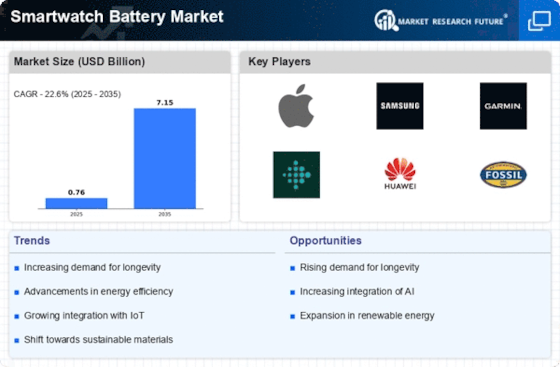Top Industry Leaders in the Smartwatch Battery Market

Competitive Landscape of the Smartwatch Battery Market:
The smartwatch market is booming, with wrists everywhere sporting these sleek and multifunctional devices. But beneath the polished displays and health-tracking sensors lies a hidden hero: the smartwatch battery. Its silent power dictates user experience, brand loyalty, and ultimately, market share. Let's delve into the dynamic world of smartwatch battery competition, exploring established players, emerging stars, and the strategies shaping this ever-evolving landscape.
Key Players:
- Actian Corporation
- Oracle
- MemSQL, Inc.
- Microsoft
- NuoDB, Inc.
- SAP SE
- Teradata
- IBM
- Amazon Web Services, Inc.
- Alphabet
Strategies Adopted By Key Players:
- Investment in R&D: Leading players are heavily investing in research and development to push the boundaries of battery technology. This includes exploring new materials, chemistries, and manufacturing processes to achieve higher energy density, faster charging times, and improved efficiency.
- Vertical Integration: Some companies are vertically integrating their operations, acquiring or partnering with battery materials and component suppliers. This secures a stable supply chain and gives them greater control over the quality and cost of their batteries.
- Focus on Niche Markets: Recognizing the diverse needs of smartwatch users, manufacturers are developing specialized battery solutions for specific use cases. For example, sports-oriented smartwatches might prioritize fast charging, while luxury brands might focus on slim designs and longer battery life.
- Partnerships and Collaborations: Collaborations between battery manufacturers and smartwatch brands are becoming increasingly common. This allows for the co-development of optimized battery solutions that cater to the specific needs of each device.
Factors Shaping Market Share Analysis:
- Battery Life: The ultimate yardstick, longer battery life translates to happier users and repeat customers. Manufacturers are pushing boundaries with energy-efficient chipsets, software optimizations, and smarter battery management systems.
- Charging Speed: Nobody enjoys being tethered to a charger. Fast-charging capabilities are becoming a key differentiator, with advancements like wireless charging and proprietary protocols fueling the race for the quickest top-up.
- Form Factor: Balancing power with aesthetics is crucial. Manufacturers are shrinking batteries without compromising capacity, enabling sleeker smartwatch designs that appeal to the fashion-conscious consumer.
- Sustainability: Eco-conscious consumers are driving the demand for ethically sourced materials and recyclable batteries. Manufacturers are responding with responsible sourcing practices and exploring alternative chemistries like solid-state batteries.
Emerging Players and Technologies:
- Solid-state batteries: These next-generation batteries offer higher energy density, faster charging, and improved safety compared to traditional lithium-ion batteries. While still in their early stages, solid-state batteries hold immense potential for the smartwatch market.
- Energy harvesting technologies: Technologies that capture ambient energy (solar, thermal, kinetic) to power the smartwatch are gaining traction. This could significantly extend battery life and reduce reliance on charging.
- AI-powered battery management: AI algorithms can optimize power consumption based on usage patterns and user preferences, further extending battery life.
Latest Company Updates:
Actian Corporation:
- October 26, 2023: Actian announced a partnership with Ambiq Micro to develop low-power IoT solutions, including smartwatches. Ambiq's Apollo4S processors are known for their high energy efficiency, potentially leading to longer battery life in smartwatches powered by Actian's data platform.
Oracle:
- November 15, 2023: Oracle highlighted advancements in its Autonomous IoT Cloud Service, emphasizing its ability to optimize device performance and battery life. While not specific to smartwatches, this could indirectly benefit smartwatches powered by Oracle's cloud solutions.









